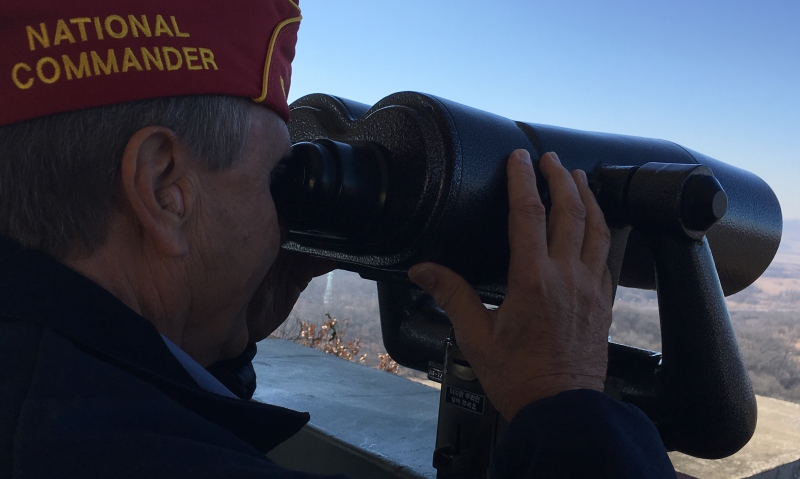
‘Miracle on the Han River’ faces severe threats
South Korea is no longer the third world “stinky country” that tour guide Kim Sam-Gon told National Commander Charles E. Schmidt it once was. “The turning point was when many American Korean war veterans returned to Seoul to attend the Olympics in 1988 and saw firsthand the economic success that led to what is often called the Miracle on the Han River. Without America’s help during the Korean War, none of this would have ever happened. It’s because Americans fought and died to keep South Korea free,” Kim said during Schmidt’s tour of the Korean War Memorial in Seoul on November 16.
Schmidt has been leading an American Legion Family delegation that includes American Legion Auxiliary National President Mary Davis on a whirlwind tour of Far East military installations and American Legion posts that will culminate during 75th anniversary observances at Pearl Harbor Hawaii on Dec. 7.
During a private meeting with the delegation, Army Gen. Vincent K. Brooks, commander of U.S. Forces Korea, emphasized the danger that the region still represents to world stability. “North Korea is working on a delivery system for nuclear weapons. They have the fourth largest military, larger than Russia’s. They have thousands of pieces of artillery that could reach Seoul,” Brooks said. “The population here counts on the strength of the U.S.–Republic of Korea alliance to keep them safe. That is the important role our veterans and active duty force have played here.”
Brooks added that the Budget Control Act, also known as sequestration, has had a negative impact on operations. “We don’t have a predictable fiscal base to make decisions. It becomes bad business. It increases our inefficiency. Nobody would run a company this way, yet the U.S. military is being caused to run in the most inefficient way possible. We have continuing resolutions every year which cause us to operate this year with last year’s requirements, which was also run by continuing resolution. Right now we are operating off a foundation from 2012. The world is not the same as it was in 2012.”
He asked that Schmidt and The American Legion to “continue to carry the message for our veterans and what we do here.” It is a message that will be enhanced by two new American Legion posts that were recently chartered in South Korea. American Legion Post 38 in Seoul and Post 37 in Pyeongtaek are the first of several that Legionnaires hope will serve active-duty members and veterans living on the Korean peninsula.
“The numbers that we have are our strength and our voice on Capitol Hill when we advocate for veterans, young people, national security and the United States of America,” Schmidt told Legion Family members there. “Membership equals revenue, not just a number. That revenue funds our posts and our programs. It’s our watch. Let’s make something good happen in our organization.”
Davis added that the American Legion Auxiliary offers scholarships and other programs to benefit military families. “It’s exciting to know that you started an American Legion Auxiliary here. There are so many things we can do to support the pillars of The American Legion. As we work our programs, we put service before self. I am so proud of our service that I made American Legion Auxiliary pride my theme for this year.”
The delegation visited troops along the demilitarized zone, the Patriots and Veterans Affairs Ministry and the Seoul-based laboratory operated by MAKRI, the South Korean agency responsible for the recovery and identification of those missing from the Korean War.
“Not everybody has come home,” Schmidt said at MAKRI. “Bringing them home is the honorable thing to do. I am glad to see that you will never give up on this and neither will The American Legion. We will not stop until there is a full accounting.”
